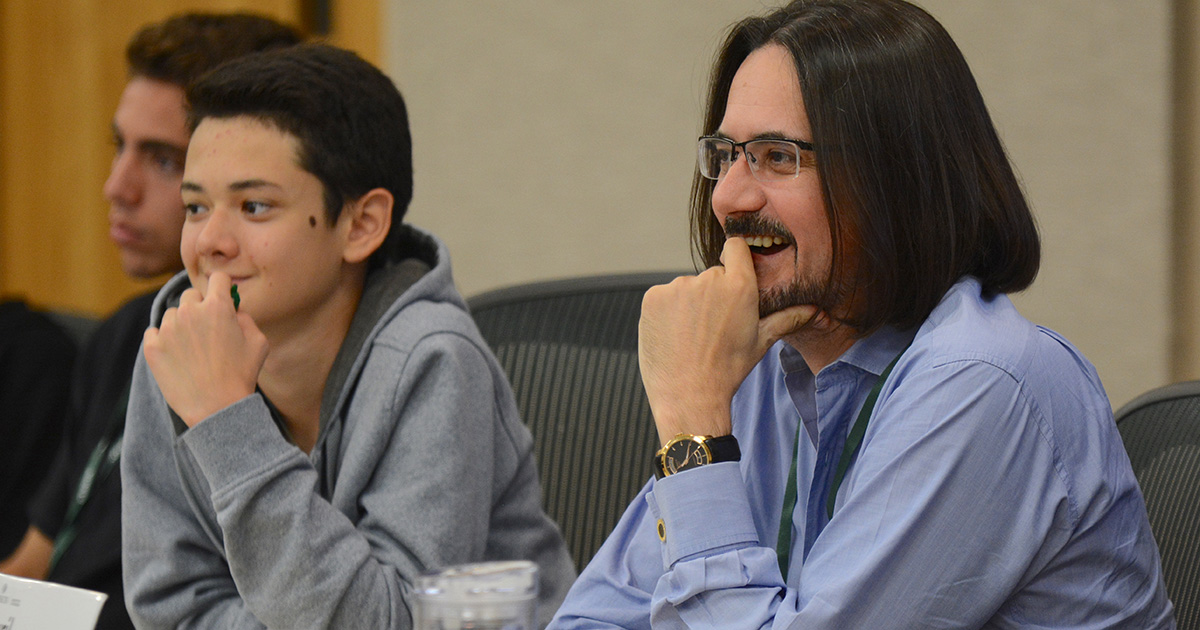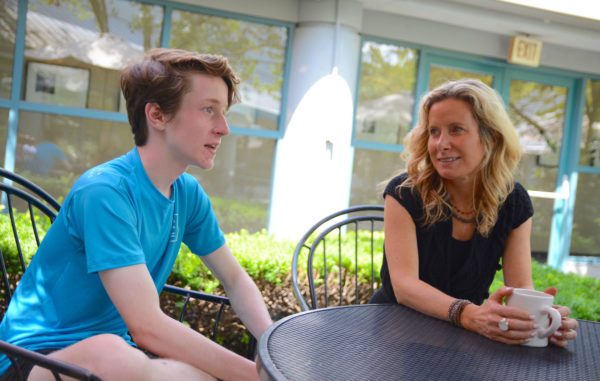A Family Affair

Teens. Parents. Communication between the two can be a bit, well, tricky.
As part of The Entrepreneurial Family program at Babson Executive Education, teens and their parents spend five solid days together. That’s a lot of time, maybe much more than some teens and parents are accustomed to.
During those five days, they’re going to lectures, working in teams, and learning about entrepreneurial thinking and leadership. They’re also talking—really talking—and discovering new things about each other.
“It’s about opening up and being transparent in a way they haven’t before,” says Matt Allen, associate professor of entrepreneurship and the program’s faculty director.
Cyril Camus ’91, along with Marc, his 16-year-old son, were among the participants in the latest edition of The Entrepreneurial Family program, which concluded in early August. Camus is such a fan of the program, now in its fourth year, that this is the second time he has attended. The CEO and chairman of the House of Camus, a maker of cognac since 1863, Camus previously came with his eldest son, Ryan.
“I hope Marc gets a good feel for what is entrepreneurship and what the world of business can be for him, not just through my eyes,” says Camus, who EY, as part of its Entrepreneur of the Year awards, recently honored with the Family Business Award for France’s Nouvelle-Aquitaine region. “It is an engaging time to spend together. You get to learn a lot with each other.”
Honest Conversations
So how open and honest are conversations in The Entrepreneurial Family program?
At one point, explains Allen, parents and teens are prompted to reveal something that they don’t know about each other. They may talk about dreams that they have, for instance, or experiences that have moved them. “That is maybe the first time they’ve had that kind of conversation,” says Allen, the faculty advisor of Babson’s Institute for Family Entrepreneurship. “They have now interacted in a way they never have before.”
By having such a revealing conversation, says Allen, they now have a template for how to carry out similar forthright talks in the future, whether in business or in life.
How parent and child perceive each other also changes during the five days, says Allen. Entrepreneurship is the focus of the program, and participants are part of teams that hone business ideas. With teens and parents interacting as peers, they gain insight into how each approaches business.
Parents may see that their child has a strategic mind, for instance, or children may catch a glimpse of how much of a risk taker their parent is. “Most education programs are focused on content,” says Allen. “In this program, the content becomes a vehicle for interaction.”
Camus agrees. “This is something Babson is uniquely placed to provide, using the tool of entrepreneurship to create this strong bonding experience,” he says.
The Next Generation
Camus is the leader of a fifth-generation family business, and one important reason he brought his son to The Entrepreneurial Family program is that Camus is thinking about the future. Marc represents the cognac maker’s next generation, and while they haven’t had a formal discussion yet about the son joining the company, this is certainly the father’s hope.
“There is this underlying understanding that this is something that is wished and desired,” Camus says. “This program is a good way to start framing that conversation.” When his eldest son, now in college, attended the program, Camus says it sparked in him an interest in business. “It was very transformative,” says Camus.
Not Taught in School
Beyond the invaluable bonding that occurs, the program also gives parents the opportunity to expose their teens to entrepreneurship.
“High schools aren’t teaching it,” says Heather Frahm, who attend the program with Will, her 15-year-old son. “Entrepreneurship is about risk and failure. Our school system is about getting A’s.”

Will and Heather Frahm
Frahm knows firsthand about the risks and rewards of entrepreneurship. Back in 1998, when the internet was still finding its stride, she co-founded Catalyst, a search engine marketing firm. “I loved being an entrepreneur,” she says. “I wish I had been exposed to it earlier in my life.”
Now the chief marketing officer at Benchmark, a provider of senior living services, Frahm believes that entrepreneurial thinking is needed in every type of business. “I think entrepreneurship should exist in every department in your organization,” says Frahm. “Everyone in your organization should bring independent thinking and a willingness to take risks.”
For his part, Will was happy to join his mother for the Babson program. “I know I’ve wanted to be an entrepreneur my whole life,” he says.
Posted in Community




